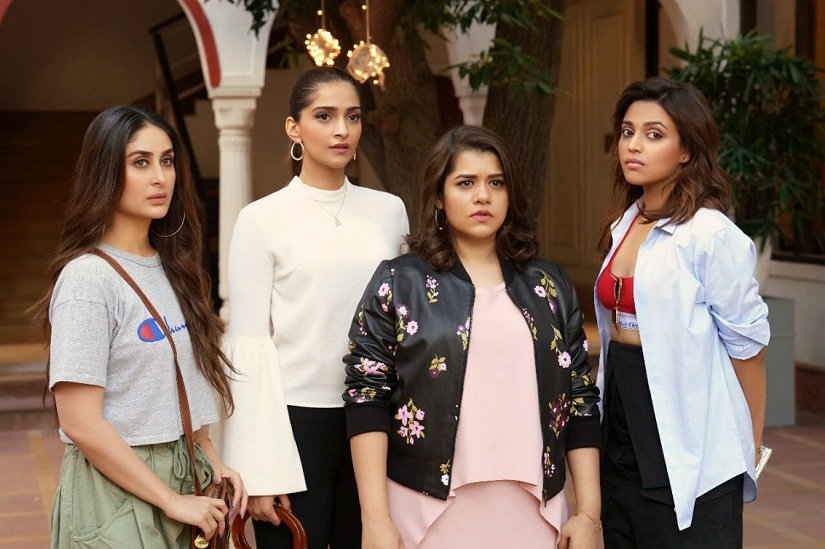In a patriarchy that polices women, the four female leads of 'Veere Di Wedding' embody possibilities

The post-Veere Di Wedding avalanche of dissections trumped the pre-Veere anticipation of seeing the Sex And The City-esque quartet of Kareena Kapoor, Sonam Kapoor, Swara Bhaskar and Shikha Talsania bring us Bollywood’s Bridesmaids. Anticipating the think pieces, the four actors’ promotion tour felt mildly apologetic. Tucked beneath the enthusiasm that kept a fire going under a film that Ekta Kapoor and Rhea Kapoor brought to screen despite the naysayers, was the disclaimer that they were not trying to make a ”˜feminist’ film – just one that entertained. Yet, before box office success tempered tongues, the blogosphere pointed out every failing like a homeless smoker ferreting out each of Swara Bhaskar’s half-smoked butts. Criticism is crucial but with the under-the-microscope quality that accompanies the way we view women rising to a new challenge (Hillary anyone?) we can miss the forest for the trees.
Along with every other Veere Di Wedding proponent trying to maintain credibility as a cineaste, let me agree, the film has issues galore. In a patchy plot that revolves around a wedding, one dimensional characters with entitled lives overdo the messaging (in this case through questionable liberation markers of partying and potty mouths) and end up on an island vacation that serves as part fashion show, part brand showcase, with a tear jerking family feud thrown in. Find me a Bollywood masala flick without most of the above and I’ll dance around a tree in the rain. Guilty of the signature failings of mainstream Bollywood, Veere still has saving graces that make it entertaining; the pace is quick, the jokes land, the central couple is one you root for, the women have palpable chemistry, and the caricatures of gaudy weddings, nouveau riche tastes and small-minded aunties are so spot on that the laughs are loud when you leave the intellect at home.
It’s in looking at the Veere in context that they go from being entertainers to revolutionaries. In a patriarchy that polices women, these four embody possibilities; Kareena’s Kalindi is tentative at best about marriage, her own parents having had a tumultuous one and her husband Rishabh, a delightful Sumeet Vyas, meets reticence with patience. Sonam’s bookish Avni is a divorce lawyer who rejects the arranged marriage route and unapologetically has a one-night stand. Shikha’s fun-loving Meera is comfortably overweight and married to John who is desperately trying to learn Hindi in a dynamic that quietly subverts colonialism. Swara’s feisty and spoiled Sakshi is on the verge of divorcing a man who, in a scene that set the Twitter trolls on fire, walks in on her masturbating and just can’t handle it. In a series of relative firsts for Bollywood, the Veere shatter the mold.
Beyond creating new archetypes, the film advances other ideas where as a society we are woefully regressive. The most stable on screen couple are Kalindi’s uncle and his boyfriend. The holiday scene is punctuated by a discussion about sex which addresses the vexingly hushed reality that having a baby can wreak havoc on your vagina. And when Kalindi’s future father-in-law finds himself in debt, the film topples a national cornerstone by implying that a big wedding is a bigger waste of money.
Like it or not, mainstream Bollywood is the foremost form of entertainment in India and as such it shapes our culture. If we have the Bollywood hero to thank for the acceptability of stalking, Veere Di Wedding ensures that young women (and men and maybe even some uncle-auntie-jis) leave the theater in small town India feeling like expectations around sexual and emotional freedom are broader. While films such as Parched and Lipstick Under My Burkha present female sexuality with an artistry and depth that’s missing here, in couching its message in typical Bollywood glitz, Veere reaches the audience, beyond metro and art house, that needs it most. In a thousand film a year industry, Veere Di Wedding has made its most feminist statement by joining the elite hundred crore club. Even as Sanju takes over the box office and theaters brace for Dhadak, the Veere have scored a lasting victory by being seen, heard and making money in an industry where economics are the holy grail and in doing so cementing that as women exploring firsts, they won’t be the last.
Soleil Nathwani is a New York-based Culture Writer and Film Critic. A former Film Executive and Hedge Fund COO, Soleil hails from London and Mumbai. Twitter: @soleilnathwani
With songs like 'Aankh' with hitmaker Sunidhi Chauhan and her recent EP 'Tiny Truths,' the…
This week, we’re tuning into new music from Goa metallers Within Ceres, Delhi NCR artist…
From Arjun Kapoor memes to AI trends, here are the Google and YouTube search results…
The Punjabi artist’s slow-building momentum turned into measurable demand across India and beyond. His recent…
“I think the Sphere is the future,” singer said of Las Vegas venue. “It’s kind…
Dotemu’s comic book action game doesn’t ask much of its players other than settling in…